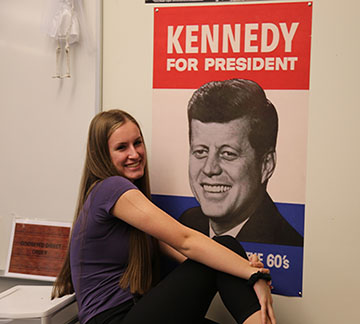Opinions On Politics
Do Glacier Peak students share as much as they’d like to?

Lizzy Carlson in front of her JFK sign.
November 7, 2017
Politics. The topic we all just can’t wait to talk about.
In reality, some of us would rather avoid this testy topic. Usually it’s because we don’t like confrontation, or we can’t handle the pressure of standing for what we believe. Or perhaps, it is because we don’t feel like it’s that important.
As teenagers, we’re stuck between being not quite children but not quite adults, a place where our opinions may be just forming, or where our minds are already made up. We’re always worried, always self-conscious of how others see us. This often leads to agreeing with our friends just to save face.
“I’m pretty conservative so I feel like I can’t voice my opinion without being attacked,” Lizzy Carlson said.
When it comes to politics, teenagers are either ready to defend their position, or ready to pull the neutral card. Some like the fight, while others would like nothing more to avoid the topic altogether. Every Glacier Peak student interviewed, though, believed that you should have an opinion on politics.
“All of this is affecting us too even if we don’t get a say in voting yet,” Anna Muszynski said.
It’s not necessary to have an opinion on fashion, or the way that teens do their hair, or even about sports. But if it concerns the way in which your country is being run, or the laws that are being made, things that affect our government and our way of life? You should absolutely have an opinion on these things.
“It’s important to have opinions, and kind of decide how you feel about certain topics and what you believe in,” Payton Quinn said.
If you believe strongly in something, one of the most important things to remember is that how you voice those beliefs. In fact, if you ever wanted to persuade someone of your stance in politics, delivery is key. Hearing from Glacier Peak, as a school they could improve in this area.
“If someone says something that’s not their opinion, they just assume they’re wrong, but no opinion is wrong,” Olivia McKenzie said. Through working on our argumentative skills as individuals, and attempting to argue civilly and more respectfully, maybe sharing opinions wouldn’t be so terrifying.

